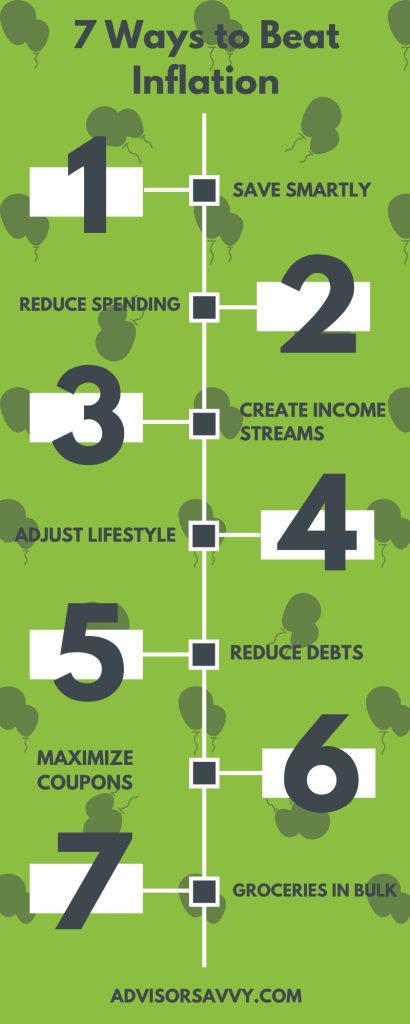
Wondering how to survive inflation and all the challenges that come with it? Then you’re in the right place. About 40 percent of the world’s population is burdened with rising inflation. In addition, Canada’s inflation rate is currently 5.9%, as of January 2023, which is well outside of the usual 2% benchmark. If you’re one of the people burdened with inflation, don’t worry! We’ve got you covered with seven pro tips.

Table of contents
You might be asking yourself, what happens when your favourite pizza that was $1 becomes $3.50? Or what happens if the cost to fill your tank is astronomically more expensive than it was a few years ago? What’s more? How do you keep up with mortgage payments when interest rates are rising to cool inflation?
These and many more questions may plague you, especially when you have a family to care for. If there’s any chance these thoughts have crossed your mind, worry not. This article will guide you on how to survive inflation.
Related Reading: Old Age Security Increase in 2023: What You Need to Know

What’s The Best Way To Beat Inflation?
The effects of inflation won’t go away with a mere announcement that the rates have dropped. Recent news reports the price of groceries was still high in Canada despite decreased inflation rates. More specifically, inflation reached an all time high in 2022 of 8%, but has since dropped to 5.9%.
So how do you survive inflation? Let’s look at the following seven tips.

Match to your perfect advisor now.
Getting started is easy, fast and free.
1. Save smartly
You might notice we didn’t just say ‘save’, but ‘save smartly’. Saving can seldom go wrong if you do it right. Even without inflation, having some money in an emergency fund brings some level of peace of mind. Not to mention, cash is king in times of inflation and overall market volatility.
We understand saving can be a pain point when the cost of everything is going up and up — but try not to be hard on yourself! If you put aside $100 every month, that can go a long way. This money can be used for unexpected price increases while you adjust your budget and cash flow.
Keep in mind the goal is not to save and invest when surviving inflation. Rather, the idea is to build up a healthy reserve in case inflation creeps up on you unexpectedly.
2. Track and reduce your spending
Surviving inflation requires a bit of delayed gratification. It’s easy to buy, buy, buy now, but those actions can quickly catch up with you. Take a moment to pause and reflect on where your money is going. Sometimes, you might be unaware since inflation radically changed the cost of what you’re used to routinely buying.
If there are subscriptions or memberships that you’re no longer interested in, cancel them. Reducing your spending also involves a personal commitment to quit impulsive buying. Furthermore, make changes to your lifestyle that are more affordable. Are you in the habit of going out for dinner every week with your partner? Try going for a weekly walk in the neighbourhood instead.
We know it’s unpleasant to cut back on spending, but it’s a necessary evil of inflation! When things cost more than they used to, you lose buying power and have to be choosier about your expenditures.
3. Create more income streams
One of the many things inflation brings is that you spend more money than you used to. Therefore, planning how to survive inflation should include new ways to make more money. Fortunately, when the economy is in a stage of upheaval like it is right now, there is no shortage of opportunity.
You can ask for a raise at your current job or double your efforts by taking up a side hustle. Another way to create more income streams is by improving your skills and portfolio. This could be going back to school or learning a new skill on your own using the world wide web. Alternatively, if you have the available cash, you can kick start your investing journey and attempt to create passive income for yourself.

Match to your perfect advisor now.
Getting started is easy, fast and free.
4. Make some lifestyle adjustments
Whether the inflation rates seem to rise or fall, its effects are usually long-term. Often after wild inflation, prices stabilize, but remain more expensive than they used to be. Some lifestyle decisions you can make during a period of inflation include:
- Grow your own food bank. You can do this by setting up a mini-garden to plant fruits and vegetables. You can also stock up on non-perishable food items when they’re a good price.
- Avoid places that will tempt you to buy things out of excitement. For instance malls or the Amazon app.
- Use public transit or walk shorter distances instead of driving or ride sharing. This will help to save gas.
- Declutter your closet and home. Sell the items you can on platforms like Facebook Marketplace and Kijiji.
- Instead of eating out, rely on home cooked meals.
- Consider quitting bad and expensive habits, like smoking, drinking or vaping.
- Perhaps a bigger consideration, but think about relocating to a place with a more reasonable cost of living.
If you’re struggling to cut back on your lifestyle choices, try to reframe your thinking. Try to conceptualize the challenge of learning how to manage your lifestyle with less than you had before. Sometimes we’re deceived that as we age we are given more and more resources to play with. Obviously that’s not true and learning to live below your means is a valuable skill.
5. Fewer debts, more investments
Periods of high inflation aren’t a time to obtain more lines of credit or take on more loans. Rather, it’s the best time to slowly clear up any existing debts and make quality investments. Think of this as a financial reset! Remember that prices of goods and services are scaling; interest rates are scaling too.
Once you manage to clean up any debts, begin investing. Times of high inflation are often ideal for investing because markets are low. You can also meet with a financial advisor to discuss the best kind of investments to explore.
6. Maximize coupons and loyalty programs
Inflation calls for less spending and you’d have to come up with creative ways to manage what’s available. Most shopping malls and grocery stores have discount and rewards programs — so get into it! It helps if you pick a program or two and remain loyal to it. In addition, there are often additional savings for students and seniors.
7. Buy groceries in bulk
Certain items like detergents, canned foods, and toiletries last for some time before they expire. You can buy these items in bulk and store them in your home. Buying in bulk prevents you from going to the mall to buy individual units repeatedly. In addition, you can take advantage of low prices now and use those materials over periods of time when prices are higher. When prices are high, you can save by only purchasing what you really need and relying on your past bulk purchases.
Related Reading: Top 10 Retirement Planning Tips for Canadians
What Assets Should I Buy During Inflation?
We mentioned above that one of the best ways to beat and survive inflation is by making investments. This is because assets and investments are sheltered from inflation in most cases. In addition, markets are typically low so you have better odds of turning a profit.
Let’s examine some of these assets to buy during inflation:
Real Estate
Real estate investments involves all things to do with land and buildings. Although, right now, it’s not a great time to buy real estate due to high prime rates and the impending housing crisis. When inflation cools and the housing market stabilizes, real estate can be a great way to shelter your money from inflation in the long run. However, there’s other ways you can get involved in the present.
Another aspect of real estate that can yield good returns during inflation are REITs (Real Estate Investment Funds). The REIT financial product is offered by various institutions that operate these trusts on a global level. You don’t need to have a ton of capital to begin investing in REITs.
Another option is to invest in stocks, mutual funds or ETFs that specialize in the real estate industry. Many stocks are undervalued at this time so it’s a great opportunity to buy.
Gold & Other Precious Assets
Gold is another asset that can keep you ahead during an inflation season. Storing up gold for a long time can yield massive interest and it has inherent value. The same is true of other precious assets, such as silver, platinum and diamonds.
There is not a 100% guarantee that investing in gold can ‘never’ go wrong. However, gold is not a common treasure that anyone can produce at any time. Its price usually hikes during inflation.
Stocks
Inflation is often an indicator of economic volatility and upheaval. For this reason, many stocks are undervalued. By purchasing them now, you have a great shot at realizing a gain in a few years. You may have to consider some basic metrics to evaluate whether a stock is under or over valued. Learning this will contribute to your investing knowledge!
Related Reading: Best Gold ETFs in Canada for 2022
What Should You Not Do During Inflation?
Sometimes it’s easier to consider what not to do instead what you should do. The following are things you should avoid during inflation:
- Spur-of-the-moment purchases or impulsive buying.
- Spending your money without a budget.
- Keep your budget and lifestyle the same as it was pre-inflation.
- Eating out almost all the time.
- Applying for more loans or lines of credit instead of dealing with your financial problems.
- Buying exotic cars or expensive gadgets that you can do without.
- Saving more than investing.
- Driving everywhere when you can take public transit, carpool or walk.
- Sticking to only one source of income or failing to increase income.
- Spending excess money on frivolous expenditures instead of setting aside an emergency fund and investing.
How To Beat Inflation In Canada
We’ve explored some of the technical aspects on how to survive inflation. But ultimately, a lot of moving through tough economic times resides in your mindset too. Here’s some tips to keep yourself in a good headspace while managing inflation:
- Focus on what you CAN do, not what you CAN’T. Maybe you set a strict budget and are having trouble following it resulting in self-blame and negative self talk. Or perhaps a bill is coming due and you don’t know how you’re going to pay it. Yes, these things are tough to handle, but don’t turn your back on yourself! Instead of focusing on what you’re failing with, focus your energy on what you can do about it. This could be creating a more realistic budget or asking friends and family for a loan to pay a bill. Try to see that there aren’t problems, only solutions!
- Tune into yourself. There’s some crazy things going on in the world right now. There are crypto financiers getting rich overnight, banks failing in the United States, and billionaires flying their jets for what would be a 20-minute drive. Experiencing all of this can make it challenging to be rational with your own finances. Try to focus less on what other people are doing with their money and more on what you can do with yours. Tune out all the financial craziness!
Related Reading: The Link Between Finances and Mental Health in Canada
Should I Pay Off Debt During Inflation?
The answer is it depends. During inflation, interest rates on debt usually skyrocket, and borrowing money becomes more challenging. Moreover, leaving existing debts would mean difficulty in paying them back later because of accruing interest. If you can manage to put money towards your debt, it’s advisable to do so. Although, some people may need to focus on earning more money first, and that’s okay too. However, you should avoid taking out new debt during periods of inflation at all costs.
How Can You Protect Yourself Against Inflation?
When you’re in the midst of inflation, it’s really about doing what you can to make it through. But if you’re struggling and want to avoid this from happening again, there are ways to protect yourself. Be sure to invest in assets that are sheltered from inflation, such as real estate and stocks. Next, live below your means, even during periods of low inflation. Whenever high inflation strikes, you’ll be better prepared. Finally, build up an emergency fund as a cash reserve to deal with high inflation in the short run.
What is the Key to Surviving Inflation?
Ultimately, inflation means consumers are able to buy less with the same amount of money. Naturally, this puts a strain on finances. There are two main approaches you can take: earn more money or cut expenditures. By adopting one or both of these strategies, you’ll be fighting inflation at it’s core.
Read More: 7 Best Gold Stocks in Canada

